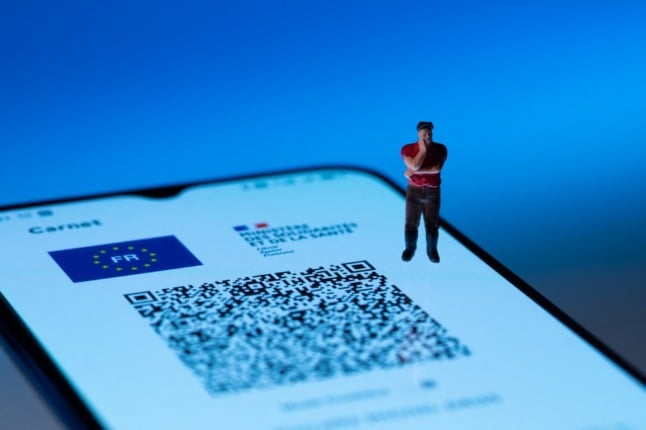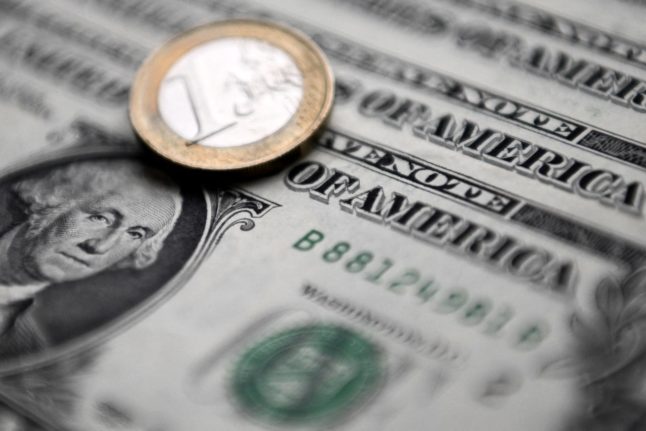Fully vaccinated visitors to France can show their own country’s vaccine certificate at the border, but once in the country they will need the pass sanitaire (health passport) to visit venues including cafés, bars, restaurants, tourist sites and long-distance train travel.
EXPLAINED How the French health pass works
For European visitors this is relatively simple – people vaccinated in the EU can use the EU digital health passport while the UK’s NHS app is compatible with the French pass – full details on how to use that here.
But for non-British or EU visitors such as Americans, Canadians, New Zealanders and Australians things are more complicated and they need to register in advance to swap their vaccination certificate for a QR code that will work with the French health passport.
This can be done online – click here for full details on how to make the swap and who is eligible.
But does the online system actually work?
Readers of The Local have provided quite mixed feedback on this – some got their code within a couple of days, others waited several weeks for it to arrive.
Added to this is confusion surrounding the issue because the system for getting a French code has changed several times. The online portal now appears to be here to stay, but is currently warning people of a wait of up to 25 days before they receive their code.
The Local advises people who have pre-planned trips to make their application one month in advance of travel. Once you have received the code there is no expiry date, and it can be used for multiple trips to France.
What if I’m still waiting?
We have received many questions from readers who are still waiting for their code by the time they arrive in France, and there are several options if you are in this situation.
CDC cards – the American CDC vaccination card is not officially accepted in France, however many visitors have reported that bars and cafés have accepted this as proof of vaccination. We should stress that this is not official, so staff are not obliged to accept the card, but if you’re still waiting for your French code this is worth a try.
Pharmacy swap – before the online portal was created, swapping non-French vaccination certificates was done at pharmacies, and some still offer this service. Again, we should stress that this is not official policy, not all pharmacies offer this and they are not obliged to do so, but readers have reported that some pharmacies still do this, so if you are still waiting for your code this too is worth a try.
Testing – the health passport has options to show either a certificate of vaccination or a recent negative Covid test. So if you are still waiting for your code, the other option is to get a test. Testing is very easy to access in France, almost all pharmacies offer Covid tests which are done on a walk-in basis without the need for an appointment and in larger towns and tourist sites there are also many pop-up testing centres. The rapid-result antigen tests are valid for the health passport and for non-residents cost €29. The test result is valid for 72 hours.
READ ALSO
French vocab
Le pass sanitaire – the health passport
TousAntiCovid – the name of the French app which hosts the passport
Une attestation de vaccination – a vaccination certificate
Un code QR – a QR code (pronounced code coo aire)
Dépistage Covid/Un test Covid – Covid testing/a Covid test
Bonjour, Pouvez-vous échanger mon attestation de vaccination américaine contre un QR code pour le pass sanitaire ? – Hello, can you exchange my American vaccination certificate for a QR code for the health passport?



 Please whitelist us to continue reading.
Please whitelist us to continue reading.
There are now more than 4,000,000 people in line at démarches simplifier, the online site run by the French ministry. Good luck. We put a request in when there were half that number and my daughter finally received hers after 7 weeks. Some museums are real sticklers about not taking the vaccine card. But they will take a rapid test that is easy to get on the street (29euros) with no appointment and they give you a QR code on a piece of paper that will work for 48 Hours. Even outdoor cafes are demanding something, test or pass.
The good news is that people are so careful that numbers are decreasing in most of France. Unlike the U.S., when people aren’t wearing a mask on a bus or train, people point it out and they politely put one on immediately.
I had the same problem, applied and at 33 days still no movement. Then I saw this article:
https://www.travelcodex.com/quick-approval-french-health-pass/
If you go down to the “Try to time your submission…” section, they recommend timing submitting your application to about 7am in France. I submitted a second application and, yes, it worked. I received my Health pass within 48 hours. I then went back and deleted the first application.
It worked for me, hope it works for you.
There is another route. Try asking at a vaccination center. The reason pharmacies and medical offices are hit and miss is that in order to create the QR code they must have access to the registration system. And, to have access to the registration system, they must currently offer vaccination services. Of course, just because a pharmacy can create the code does not mean they feel comfortable and will actually do it.
On the other hand, vaccination centers by definition have access to the registration system and all of them are therefore capable of generating a QR code based on some other certificate, for example, the US CDC card. The trick is convincing them to do it. We had friends visit and we tried three centers before I found one that would make the QR code needed for the Tous-Anti-Covid app. It should go without saying that the request must be sincere and properly polite, and, in French.
Mine took about 3 weeks, and arrived two days before my flight (24 Sept). I’m guessing they may be prioritizing based on the date of your flight, but who knows? Anyway, it was very handy to have.
Another American I met over there said he didn’t have any problems using his CDC card, so it sounds very hit-or-miss on that. I had many cafés and restos not even ask for it. But the museums all did.
We applied on-line on September 1 and had not received our passes when we arrived in France on 9/15. We went to the Pharmacie on Filles du Calvaire and got it by presenting our CDC card and passport and paying 20 euros. About 10 days later I got notification that my application had been approved! Seems like there should be some way to coordinate data, but I know it’s been overwhelming. I asked at several restaurants and museums if they would take the CDC card if someone didn’t have a passport, and my small sample all said yes. But it’s a lot easier and safer to have the QR code on your phone.
I just spoke with two Americans who recently returned from Paris. They indicated that the CDC card was not accepted at restaurants and that they had to have a test every three days to access a Passé Sanitaire. It was very discouraging news as we leave in two weeks and were planning to rely on the CDC card.
We experienced the same several weeks ago. We applied on line but got the response after we returned…
All of the Pharmacies pretty much do the tests so we hit one on the afternoon that we arrived – the process was easy get the Covid Test and have the QR Code issued. We had no problems getting in to any of the events / venues for our stay. We had the second test done to be able to return to the US. So really other than the cost (about $25 x 4) the process went smoothly.
I just got back from Paris a month ago, and I met 2 couples who said that everywhere they went to accepted the CDC card. It just depends on who you talk to. See my response above and go to that pharmacy. Don’t worry, it will all work out.
I got mine by going to Les Filles du Calvaire Pharmacy in the 11th arrondissement on September 4th 2021. Easy Peasy—don’t sweat it out hoping to get it before you leave. I made that mistake and worried myself sick.
It cost me €20, but that’s a small price to pay vs. trying to navigate the online system—if you can call it a system.
Yes. It’s indeed a small price to pay and we would happily do it. Do you think they are still doing it there? The beginning of September is a long time ago, given the way things are constantly changing. Many report that the pharmacies are now forbidden to do this. Any thoughts?
A friend of mine got the Pass Sanitaire at the same pharmacy on October 13. I’m sure they are still doing them.
You’re right, Technically pharmacies aren’t supposed to convert them, but nobody is enforcing it. There are quite a few pharmacies who do it for a fee. I know of several more.
We submitted our applications on October 7th. I’ve checked the website periodically. Today I found a notice that our application was set to expire, and that no one had looked at it yet (which is consistent with earlier visits to the website). There was a button you could click to extend for another month, which I did, of course. No e-mail notification of the “about to expire” issue. Very discouraging.